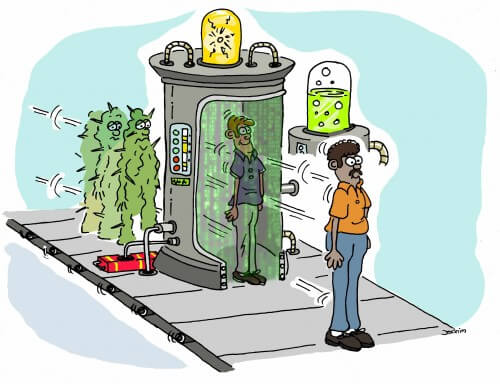"A new and completely unexpected biology that provides us with the code, the software, to turn off cancer," says the study's lead researcher Panos Anastasiadis, head of the cancer biology department at the Mayo Clinic Medical Center in Florida.

[Translation by Dr. Nachmani Moshe]
Cancer researchers dream of the day when they can force cancer cells to become healthy cells again. Now, researchers from the Mayo Clinic Medical Center in Florida have found the way that may cause cancer cells to reprogram while turning them back into healthy cells.
The research findings, published in the scientific journal Nature Cell Biology, present "a new and completely unexpected biology that provides us with the code, the software, to turn off cancer," says the study's lead researcher Panos Anastasiadis, head of the cancer biology department at the Mayo Clinic Medical Center in Florida.
This code was revealed as part of the discovery that adhesion proteins (Wikipedia) - the "glue" that connects the cells to each other - react with a microprocessor which is the key component in the production of molecules known as microRNA (short single-stranded RNA molecules used to control gene expression, (microRNA). "A control all cellular activity by controlling the expression of groups of genes at the same time. The researchers found that when healthy cells come into contact with each other, a defined group of microRNA molecules turn off the genes that promote cell growth. However, when the ability to infect In disrupted cancer cells, those same molecules are actually responsible for poor expression and thus cause uncontrolled cell growth. The researchers have demonstrated, currently in laboratory experiments only, that restoring the normal levels of those microRNA molecules in cancer cells may cancel the uncontrolled growth.
"The research combines two fields of science that were not related to each other until now - cell-to-cell adhesion and microRNA biology - and advances the solution of an age-old problem that has challenged scientists for many years regarding the role of adhesion proteins in the framework of cell activity," explains the researcher the main "And the most important result of this research lies in the fact that it provides us with a new approach to cancer treatment," adds the researcher. The problem stemmed from conflicting reports regarding two adhesion proteins (E-cadherin and p120 catenin) that are essential for the proper formation of cell tissues, when some researchers believed that these proteins may also be tumor-inhibiting substances. "However, we and other researchers believed that this theory is not correct in light of the fact that these two proteins are still found in cancer cells and are even required there for continued growth," explains the researcher. "This finding made us believe that this molecule has two faces - a positive one designed to preserve the healthy activity of the cells, and a second face - the cause of tumor development," says the researcher.
In order to solve this mystery, the researchers tested a new protein known as PLEKHA7, which works in collaboration with the two adhesion proteins E-cadherin and p120 catenin only at the upper edge of epithelial cells (tissue that covers the outer surfaces of organs in the body and is at the border between the external environment and the internal environment). The researchers discovered that this protein (PLEKHA7) preserves the normal activity of the cells with the help of a collection of microRNA molecules through the connection of the microprocessor to the two adhesion proteins. In this way, these two proteins demonstrate the positive side of their activity - inhibiting the development of a cancer tumor. However, after this adhesion goes awry due to the loss of the PLEKHA7 protein, there was a disturbance in the regulation of the amount of microRNA molecules and then the adhesion proteins changed their appearance and became proteins that encourage the development of cancer", explains the researcher. "We believe that the disruption in the microprocessor coupling is a preliminary stage, and probably a general one, in all types of cancer," claims the researcher. "In the vast majority of the human cancer cell samples we tested, we discovered that this coupling was missing, even though the two adhesion proteins were still found there. The situation is similar to accelerating the car while driving (the adhesion protein in its negative activity) while losing its brakes (the microprocessor clutch). "By supplying the microRNA molecules whose concentration has decreased inside the cancer cells, we can repair the "brakes" and restore the normal activity of the cell," explains the researcher. "Preliminary experiments in aggressive types of cancer do show very promising results," concludes the researcher.

One response
Thanks to Dr. Nachmani for another wonderful article.
Now the cancer cells should really start to fear us and we can be less afraid of them..:)